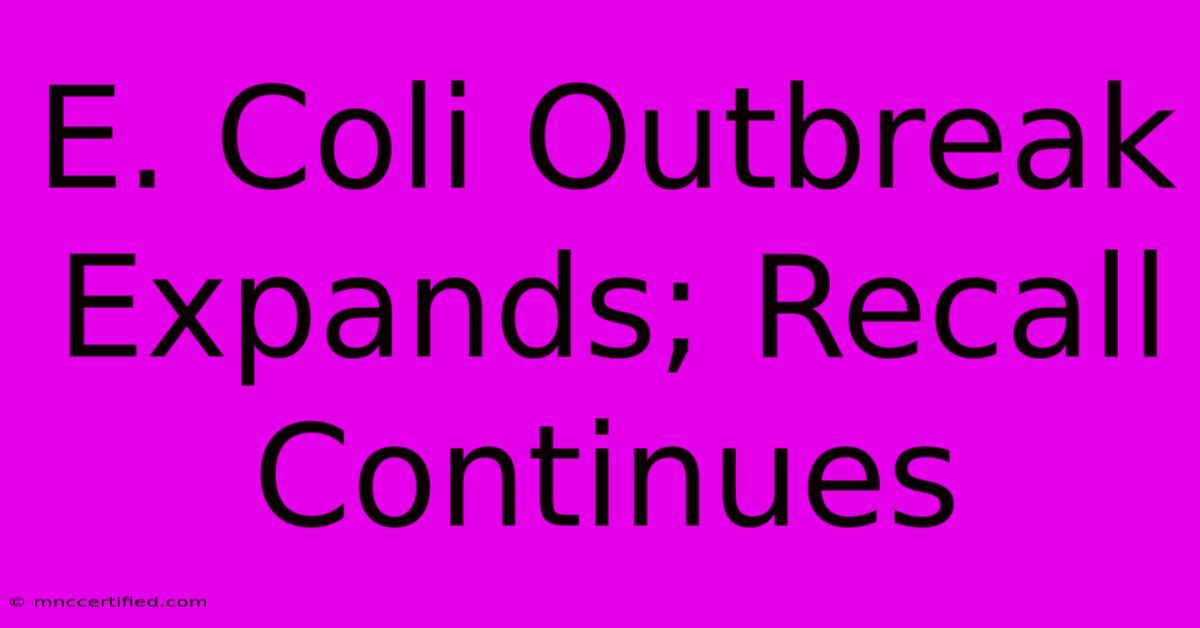E. Coli Outbreak Expands; Recall Continues

Table of Contents
E. Coli Outbreak Expands; Recall Continues: What You Need to Know
An E. coli outbreak linked to contaminated romaine lettuce has expanded, prompting an ongoing recall and raising serious concerns about food safety. This situation underscores the importance of understanding the risks associated with foodborne illnesses and taking proactive steps to protect yourself and your family. This article will provide you with the latest updates on the outbreak, guidance on identifying contaminated products, and crucial information on preventing E. coli infection.
Understanding the E. coli Outbreak
The recent E. coli outbreak, traced back to [insert source of contamination if known, e.g., a specific farm or distributor], has resulted in [insert number] confirmed cases across [insert affected regions]. Symptoms reported include [list common symptoms: diarrhea, stomach cramps, vomiting, fever]. Severe cases can lead to hemolytic uremic syndrome (HUS), a potentially life-threatening complication.
This outbreak highlights the vulnerability of our food supply chain and the critical need for rigorous safety measures at every stage, from farm to table. The rapid spread of the bacteria underscores the importance of timely identification and swift action by health officials and food producers.
Identifying Contaminated Products
Consumers are urged to check their refrigerators and discard any romaine lettuce that may be affected. The recall currently includes [insert details of recalled products, including brands, package sizes, and identifying codes]. Pay close attention to "best by" or "use by" dates, but remember that contaminated products may not necessarily be past their expiration date.
If you are unsure whether your lettuce is part of the recall, contact the manufacturer or retailer directly. Many stores have posted recall information prominently in their produce sections.
Preventing E. coli Infection
Preventing E. coli infection is crucial, especially for vulnerable populations such as young children, the elderly, and individuals with weakened immune systems. Here are some key steps you can take:
Food Safety Practices
- Wash your hands thoroughly: Wash your hands with soap and water for at least 20 seconds before and after handling food.
- Wash produce carefully: Wash all fruits and vegetables thoroughly under running water, even if they're pre-washed. Scrub firm produce with a brush.
- Cook food to safe temperatures: Ensure that ground beef and other meats are cooked to the recommended internal temperature to kill any harmful bacteria.
- Avoid cross-contamination: Use separate cutting boards and utensils for raw meat and ready-to-eat foods.
- Refrigerate perishable foods promptly: Refrigerate leftovers within two hours (one hour if the temperature is above 90°F).
Recognizing Symptoms
Be aware of the symptoms of E. coli infection. If you experience severe diarrhea, stomach cramps, vomiting, or fever, seek medical attention immediately. Early diagnosis and treatment are essential to prevent serious complications.
Staying Informed and Taking Action
Staying informed about the outbreak is crucial. Monitor updates from the [insert relevant health authorities, e.g., CDC, FDA] websites and local news sources. Report any suspected cases of E. coli infection to your healthcare provider. By taking proactive steps and staying informed, you can help protect yourself and others from this serious threat.
Keywords for SEO Optimization
This article incorporates several keywords relevant to the topic, including but not limited to: E. coli outbreak, romaine lettuce recall, food safety, food poisoning, E. coli symptoms, hemolytic uremic syndrome (HUS), foodborne illness, contaminated food, food safety tips, preventing E. coli, CDC, FDA, recall information. The keywords are naturally integrated throughout the text to avoid keyword stuffing.
Off-Page SEO Strategies
To further enhance the article's visibility, consider these off-page SEO strategies:
- Share on social media: Share the article on relevant social media platforms.
- Link building: Reach out to relevant websites and blogs in the food safety and health sectors and request backlinks to the article.
- Guest blogging: Consider guest blogging on relevant websites to include a link back to the article.
By implementing both on-page and off-page SEO strategies, you can significantly improve the article's ranking in search engine results pages (SERPs), ensuring it reaches a wider audience and effectively informs the public about the ongoing E. coli outbreak and its implications. Remember to keep the article updated with the latest information as the situation develops.

Thank you for visiting our website wich cover about E. Coli Outbreak Expands; Recall Continues. We hope the information provided has been useful to you. Feel free to contact us if you have any questions or need further assistance. See you next time and dont miss to bookmark.
Featured Posts
-
Car Insurance For Impounded Cars
Nov 22, 2024
-
Russias Missile Attack On Ukraine Putin
Nov 22, 2024
-
Fede Alvarez Ilm And Romulus
Nov 22, 2024
-
Michael Ludwig Shelter Insurance
Nov 22, 2024
-
Shelter Insurance Bloomington Il
Nov 22, 2024